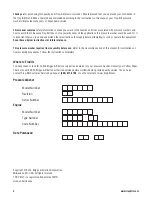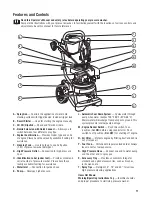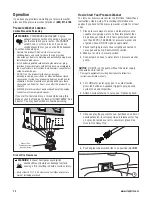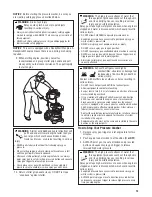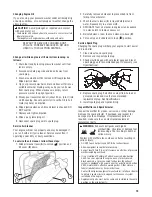
Operator Safety
Equipment Description
Read this manual carefully and become familiar
with your pressure washer. Know its applications,
its limitations, and any hazards involved.
This pressure washer operates at a maximum of 2,700 PSI
(186.1 BARS) and a flow rate of up to 2.3 gallons per minute
(8.7 liters per minute). This high quality residential system
features 10” (25.4 cm) wheels, axial cam pump with
stainless steel pistons, automatic cool down system,
cleaning tank system, quick connect spray tips, heavy duty
25’ (7.6 m) hose, and more.
Every effort has been made to ensure that information in this
manual is accurate and current. However, we reserve the
right to change, alter, or otherwise improve the product and
this document at any time without prior notice.
The Emission Control System for this pressure washer is
warranted for standards set by the Environmental Protection
Agency and the California Air Resources Board.
Important Safety Information
Safety Symbols and Meanings
The safety alert symbol indicates a potential personal
injury hazard. A signal word (DANGER, WARNING, or
CAUTION) is used with the alert symbol to designate a
degree or level of hazard seriousness. A safety symbol may
be used to represent the type of hazard. The signal word
NOTICE
is used to address practices not related to personal
injury.
DANGER
indicates a hazard which, if not avoided,
will
result in death or serious injury.
WARNING
indicates a hazard which, if not avoided,
could
result in death or serious injury.
CAUTION
indicates a hazard which, if not avoided,
could
result in minor or moderate injury.
NOTICE
address practices not related to personal injury.
4
www.troybilt.com
Fire
Explosion
Toxic Fumes
Hot Surface
Moving Parts
Electrical Shock
Slippery Surface
Fall
Kickback
Flying Objects
Fluid Injection
Operator’s Manual
Chemical Burn
Projectile
WARNING
POISONOUS GAS HAZARD. Engine
exhaust contains carbon monoxide, a poisonous
gas that could kill you in minutes. You CANNOT
smell it, see it, or taste it. Even if you do not
smell exhaust fumes, you could still be exposed to carbon
monoxide gas.
Some chemicals or detergents could be harmful if inhaled
or ingested, resulting in death, serious injury, nausea,
fainting or poisoning.
• Operate this product ONLY outside far away from windows,
doors and vents to reduce the risk of carbon monoxide gas
from accumulating and potentially being drawn towards
occupied spaces.
• Install battery-operated carbon monoxide alarms or plug-in
carbon monoxide alarms with battery back-up according to the
manufacturer’s instructions. Smoke alarms cannot detect
carbon monoxide gas.
• DO NOT run this product inside homes, garages, basements,
crawlspaces, sheds, or other partially-enclosed spaces even if
using fans or opening doors and windows for ventilation.
Carbon monoxide can quickly build up in these spaces and can
linger for hours, even after this product has shut off.
• ALWAYS place this product downwind and point the engine
exhaust away from occupied spaces.
If you start to feel sick, dizzy, or weak while using this product,
shut it off and get to fresh air RIGHT AWAY. See a doctor. You
may have carbon monoxide poisoning.
• Use a respirator or mask whenever there is a chance that
vapors may be inhaled when using chemicals.
• Read all instructions with mask so you are certain the mask will
provide the necessary protection against inhaling harmful
vapors when using chemicals.


